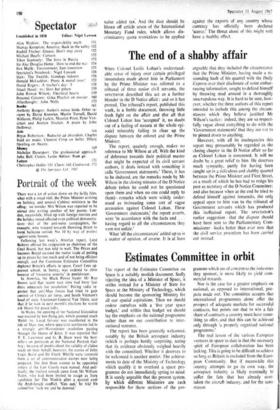The irresponsible Germans
There is more than one way of being an irresponsible member of the community of nations. There is General de Gaulle's method. And there is the German method.
The threat to the West at the present, time is not military but economic: the danger of a further slowing down in world trade and a chain-reaction of economic crises which, if unchecked, could lead to a world slump. And the threat comes from Germany. World prosperity depends on good behaviour by creditors as much as on good behaviour by debtors. The outstanding creditor nation in the world today is Germany. Her present eco- nomic policy is utterly inappropriate to this status.
Two years ago, it is true, the West German government had a nasty fright. In 1965 the Federal Republic ran a trade deficit of almost £600 million, In spite of the fact that Ger- litany's gold and foreign exchange reserves were three times as large as Britain's and big enough to finance a deficit on this scale for four years in succession, the luckless Chan- cellor Erhard informed an incredulous world that the deutschnutrk was in danger. Severe internal deflationary measures were taken, and by this spring unemployment had reached over 600,000 workers—most of them the so- called 'guest-workers' from other, less pros- perous, neighbouring countries, which no doubt made it somewhat easier to bear.
The payments crisis passed. Last year Germany moved modestly back into the black, and this year the surplus looks like running into billions of deutschmarks. But Germany's recovery has been at her neigh- bours' expense. In good times and in bad her exports have continued to surge ahead— by 10 per cent in 1965, by 12 per cent in 1966, and by 10 per cent again so far this year. But her imports have slumped—down 9 per cent in the first quarter of 1967, after only a minimal increase last year. Countries like Greece. Spain and Turkey have suddenly seen their valuable earnings from the remit- tances of their nationals working in Germany disappear. The French government has found its own efforts at reflation frustrated by the decline in orders from across the Rhine, France's biggest export market. Some of the smaller European countries—notably Belgium—are facing something very like a slump from the backwash of the German recession. And Britain and the United States, each with balance of payments troubles of its own, are finding their own margins of manoeuvre further reduced by the loss of sales to Germany (and other markets affected by the German recession) as well as by the growing competition of German exports.
Yet in spite of the rapid and complete cure of Germany's ephemeral payments crisis, the Federal government has taken no effec- tive steps to reverse its internal policies— even though by persisting in them long after the justification has disappeared it is relent- lessly pushing the world to the brink of re- cession. The Germans complain that they are hamstrung in their efforts to re-expand internal purchasing power because they can- not control the budgets of the local Lander governments; but it is not wholly clear that Bonn (and its finance minister Herr Franz- Josef Strauss in particular) are in overmuch of a hurry to get round this obstacle anyway. The largely phoney German economic crisis was deliberately built up and exaggerated by the political enemies of Dr Erhard (includ- ing Heir Strauss) as a means of discrediting value added tax: And the dust should, be blown off article seven of the International Monetary Fund rules, which allows dis- criminatory quota restrictions to be applied against the exports of any country whose currency has officially been declared 'scarce.' The threat alone of this might well have a healthy effect.































